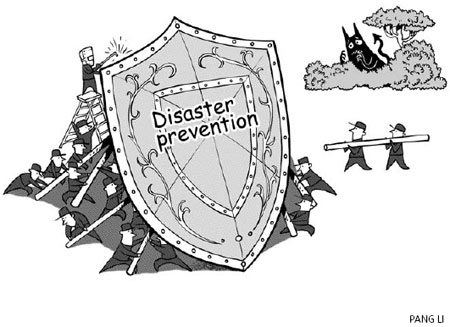
|
CHINA> News
 |
|
Are we better prepared for another disaster?
(China Daily)
Updated: 2009-05-16 11:07 The Chinese media has gone to extremes in observing the first anniversary of the devastating Wenchuan earthquake in Sichuan province. The first was a chorus of how wonderful we are that dominated some of the news pages and prime-time slots. The chorus was so loud that it almost drowned the country's first Disaster Prevention and Reduction Day on May 12.
Yes, we are wonderful, and we have always been so. And yes, we will feel the pain of human loss and suffering. But a moment like this should not be used just as another occasion to celebrate greatness or shed tears for heartbreaks. There's something more urgent and meaningful than simply bragging about our might or showing our grief. The question greater than all the tear-jerking shows on such anniversaries should be: Are we better prepared to face a similar natural disaster?
Scientists say China has 23 earthquake belts across five regions. That means a huge population is living in the shadow of a geological disaster. How strong are the buildings in those areas? Have the ones not strong enough to withstand an earthquake been reinforced? Have the people there been taught how to respond in an emergency? The Tangshan earthquake in 1976 claimed more than 240,000 lives, while the Sichuan earthquake a year ago left about 90,000 dead or missing. If we fail to learn a lesson from so many deaths, those lives would indeed be lost in vain. We have learned from previous disasters that most quakes still cannot be predicted. But we should also learn how to respond effectively when the unexpected ones strike. To me, practical knowledge is far more important than tear-jerking shows and resonant odes. We cannot afford to wait till another natural disaster strikes to learn life-saving and survival skills. Such knowledge is especially vital for our kids. But even trained people cannot be allowed to put their knowledge to use only after a disaster strikes. Routine maneuvers should be held to develop people's ability to cope with risks, especially those living in the earthquake belts. It is important, too, to have such routine maneuvers institutionalized, which can help save many a life. We may need odes to boost our morale and tear-jerking stories to give vent to our grief. But if our memory of Wenchuan and Tangshan stops there, we will blind ourselves and limit our capability to prevent and reduce future disasters. As a country vulnerable to natural disasters, China needs a pre-warning mechanism much more than odes and grievances. That's why the Disaster Prevention and Reduction Day should not be allowed to fade into one of just mourning or celebration. Instead, it should serve as a reminder of the dangers we live with, a chance to check if we have the ability to put surviving skills to use, and a reflection on how we can better prevent and reduce disasters. The day should make us review what we have done for those injured in such disasters and forced to live with physical disabilities. Have we built adequate facilities for them? Have we done enough to minimize the obstacles they would face in life? We have surmounted many difficulties to overcome the shock of the Wenchuan earthquake. But there is much more to do, for there greater goals to be reached. Odes and tears are no solutions to the problems confronting us. What we expect more from the media is a down-to-earth approach to disaster prevention and reduction. The author is a guest professor of journalism with the Beijing Foreign Studies University.

|